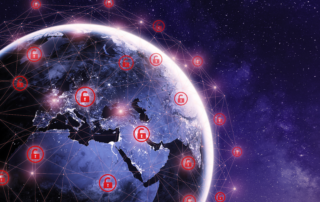Global supply-chains are often taken for granted when businesses expand nationally and internationally.
Supply-chain vendors are often selected as quickly as possible to keep the movement of goods and supplies or manufacturing capabilities moving rapidly and at a reasonable cost. During 2020, due to major supply-chain disruptions, there have been far greater opportunities for fraud and corruption. Many factors are involved including speed to get goods manufactured and delivered to global markets, and a variety of other market demands. Supply-chains are also fractured due to the pandemic. With most countries involved in repeat lockdowns to prevent the spread of the pandemic, many business practices have had to adapt “on the fly”, resulting in increased opportunities for fraudsters to take advantage of vulnerabilities.
Most companies focus on opportunities to reduce logistical expenses by building manufacturing or distribution centers in "best-cost" developing countries, or emerging growth markets where labor may be significantly cheaper. However, fewer companies are recognizing the inherent increase in risk in these countries and the critical need to mitigate those risks. For example, few companies are aware of this startling statistic: 35% of global agents and distributors have corruption-related issues.
Not only are companies unaware, most are unprepared to deal with the associated risks. Research indicates that when it comes to combating corruption risks, the majority of businesses operate with a reactive and unstructured approach. Many small or mid-cap companies with limited internal resources are woefully unprepared. Some companies, especially larger corporations, may implement vendor screening and risk ranking of their global supply-chain and through reviews by their legal or compliance department. However, too often, risk ranking is based on very limited due diligence information, therefore many important risks may be missed. The costs of corruption-related issues can be high in the form of penalties, fines, reputation damage, or even imprisonment of key executives, let alone loss to revenue and business.
In 2019, Transparency International found “anti-corruption efforts stagnating even in G7 countries.” The United States received its lowest score in eight years at 69 out of 100. In 2020, only a year later, instead of doing better, the United States dropped another 2 points to a score of 67 out of 100.
Along with this, the UN Global Compact released a report on fighting supply chain corruption which reported “the cost of corruption equals more than 5% of the global GDP (US $2.6 trillion), with over $1 trillion paid in bribes each year.”
Also in 2020, according to The FCPA Blog, the DOJ and SEC brought FCPA enforcement actions against 12 companies and imposed financial penalties totaling a record $6.4 billion. In comparison, in 2019, 14 companies paid a (then) record $2.9 billion to resolve FCPA cases.
Cooperation between corporations and multi-national government agencies to uncover violations has also grown due to more and more companies having a global supply chain and the need to enforce cross-border actions to reduce the impacts of bribery and corruption globally. This resulted in an increase in multi-jurisdictional FCPA cases and other countries have now begun to adopt FCPA laws similar to those in the United States. Foreign governments received more than $5 billion in 2020 related to FCPA settlements from global anti-corruption cases.
In some locations, bribery and fraud are common practices. Collusion, in the form of kickbacks or gifts, to receive contracts or misrepresent services and goods in various places is an accepted practice. Human rights, modern slavery, and environmental issues also come into play.
In 2019, Apple’s supplier factory in China, Foxconn, was in the news for labor law violations. In 2020, Apple’s China supply chains again came under scrutiny on December 31 when workers at Apple’s supplier Pegatron staged a protest over owed wages, according to China Labor Watch.
So, what does a company need to do to mitigate risk in its supply chain? Here are 5 things you should know when addressing this risk:
Just as its important to go to a doctor or dentist to check on your personal wellbeing. It is important to take a look at your corruption risk if you are dealing with suppliers and sub-contractors. An independent investigative firm can conduct a risk assessment to see how your business, and supply chain vendors, are rated on a risk basis. It is crucial that the investigative firm have both long-standing experience and expertise in the investigative field and supply change risk assessment along with global resources and reach. After all, you cannot mitigate risks that you have not yet identified.
Not only should you start to conduct internal and external risk audits on a regular basis, but you should also evaluate the basis of your current supply-chain risk assessments. Are your risk ranking measures sufficient to detect supplier changes and detect different types of fraudulent activity? Questionnaires alone are insufficient for this purpose. Factors may have changed due to the pandemic that may previously have remained stable but no longer are. Quality is even more important than frequency, for employees as well as suppliers and sub-contractors. Identifying internal risks is as important as identifying external risks from your supply chain. A fresh review of these factors may be critical as the pandemic lessens in impact but supply-chains remain fractured or shift in a new business reality.
Preemptive care and ongoing transparency are a business’s best practice when it comes to mitigating risk. It is important to create a risk compliance program with the assistance of an external, third-party global security and risk management firm that is an expert in deep due diligence investigations at individual and corporate levels world-wide.
Partnering with an external investigative firm also helps prevent any potential bad actors or simply inexperienced in-house teams from not implementing the program that is best suited for your needs.
Some steps in a good compliance program include:
It is important to emphasize training to give your staff the tools to identify potential risk areas, know what is expected of them, and improve detection measures.
After transparency, traceability is the next key aspect in mitigating risk. Traceability can help ensure there is less corruption in your supply chain by enhancing your ability to identify, track and trace the elements of your services or products. The better you are able to trace these aspects of your business, the less chance of corruption and the more quickly you can respond to any issues that may crop up.
Due diligence of executives is different than due diligence of businesses. Sometimes referred to as an executive background check, investigates more than 30 components of public record information compared to routine employment type background checks that are typically limited to a 5-component review of criminal history, education and employment history suitable for an employment review at staff levels but insufficient for executive levels. It includes in-depth reviews of news and other media sources, as well as a deep, dark and historical internet search.
Deep due diligence, unlike standard background checks, can reveal information of critical importance that would otherwise have been left undiscovered. Background checks of executives yield fewer than 1% of serious issues, whereas deeper due diligence will yield 20% of information that you would want to know to protect your company’s reputation and exposure to misconduct and malfeasance.
Business due diligence is similar and when done thoroughly yields an average of 35% serious issues, mostly related to corrupt activities. Doing deep due diligence on your supply chain or encouraging it to be done by the companies in your supply chain can go a long way in mitigating your risk.
Partnering with a neutral third party investigative firm helps protect you and your company. The value of a corruption risk assessment, creating and implementing risk compliance programs and trainings, and having deep dive due diligence conducted internally and externally is heavily dependent on the skill and expertise of the investigative firm you partner with. Look at key executive hires, M&A deals, and third parties in your supply-chain so you can make better informed risk decisions and prevent "bad actors" from damaging your business and its reputation.
Not all firms performing supply chain investigations, background checks, executive due diligence are equally skilled or experienced. Choose an external investigative partner whose core business is to perform deep due diligence investigations at both the individual and company level with globe-spanning resources and long-standing expertise that are highly experienced in supply chain risk mitigation. Make sure they have excellent connections to check in other countries also; “boots on the ground” capabilities are often essential in high growth and emerging markets to check that supply chain businesses are who they say they are.



